By Martin Ekpeke
While the digital economy being vigorously pursued by the federal government is seen as the way to go to engender growth of the Nigerian economy, an expert who knows the workings of the digital economy has also identified three key challenges that will likely slow down the push.
This expert is Engr: Ikechukwu Nnamani, the Chief Executive Officer of Digital Realty (Formerly Medallion Data Centres Limited).
In his presentation on the ‘Myths and Realities of Nigerian Digital Economy’ at the ‘50 Most Valuable Personalities in Nigeria’s Digital Economy Conference & Award in Lagos last week, Engr. Nnamani mentioned disruption in labour market, cyber security and massive investment in ICT infrastructure as three key areas of challenges in Nigeria’s digital economy.
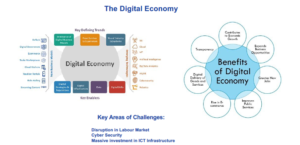 The former President of the Association of Telecom Companies of Nigeria (ATCON) explained that while the digital economy will create jobs in so many areas, it will also disrupt the existing job structure in Africa. Thus, he advised training and retraining to adapt to the current realities that come with the digital economy.
The former President of the Association of Telecom Companies of Nigeria (ATCON) explained that while the digital economy will create jobs in so many areas, it will also disrupt the existing job structure in Africa. Thus, he advised training and retraining to adapt to the current realities that come with the digital economy.
“As Nigeria and Africa continue to progress in digital economy adoption, so is cybersecurity and its attendance impacts, which presents both a risk and an opportunity for the country. So, for Nigeria to reap the benefits of the digital economy, there must be a follow-up massive investment in ICT infrastructure to build a secure and trusted digital space, attracting more investment and innovation, which we need for a thriving digital future,” he said.
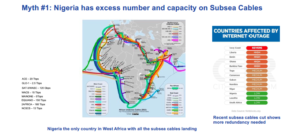 Benefits of the digital economy
Benefits of the digital economy
- Contributes to economic growth
- Transparency
- Digital delivery of goods and services
- Rise in eCommerce
- Improved public services
- Create new jobs
- Expand business opportunities
He noted that Nigeria is poised to be the largest digital economy in Africa but more work needs to be done in implementing the right policies and infrastructure needed to achieve this.
Digital Economy key enablers
- Digital strategies & regulations
- Digital infrastructure
- Data
- Digital skills
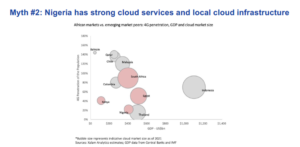 Meanwhile, the dominance of the digital business model and the rise of the industry ecosystem will be the key defining trends as new business models such as Fintech, Digital government, cloud kitchens, vacation rental, ride-hailing, eCommerce and streaming content will thrive in the digital economy.
Meanwhile, the dominance of the digital business model and the rise of the industry ecosystem will be the key defining trends as new business models such as Fintech, Digital government, cloud kitchens, vacation rental, ride-hailing, eCommerce and streaming content will thrive in the digital economy.
Presently, Nigeria is undergoing accelerated digitization of the consumer and enterprise economies, driving demand for people with digital skills, data center capacity and attracting new providers into the market.
The five myths about Nigeria’s digital economy
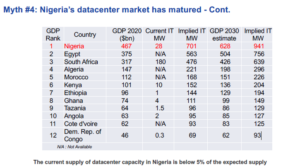 Speaking further, Engr. Nmamani identified five myths many people believe about the entire spectrum of Nigeria’s digital economy. They are as follows:
Speaking further, Engr. Nmamani identified five myths many people believe about the entire spectrum of Nigeria’s digital economy. They are as follows:
- Nigeria has an excess number and capacity of Subsea Cables
- Nigeria has strong cloud services and local cloud infrastructure
- The Digital Economy will be primarily driven by Telcos
- Nigeria’s datacenter market has matured
- Nigeria’s GDP makes it the leader in Africa’s digital economy
Explainer
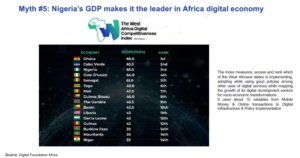 Disputing these claims, Engr. Nnamani said the recent subsea cables cut shows more redundancy needed. Also, out of the ten major cloud service providers, none has its critical infrastructure in Nigeria.
Disputing these claims, Engr. Nnamani said the recent subsea cables cut shows more redundancy needed. Also, out of the ten major cloud service providers, none has its critical infrastructure in Nigeria.
On the claim that Digital Economy will be primarily driven by Telcos, he argued that Tier 1 Hyperscaler are all investing in similar areas with a common goal of creating an end-end digital ecosystem and the sole aim of maximizing data monetization, which is their core business.
On myth 4, he noted that Nigeria is the country with the largest datacenter potential in Africa but currently lagging behind smaller economies such as South Africa and Egypt, even as the current supply of datacenter capacity in Nigeria is below 5% of the expected supply.



